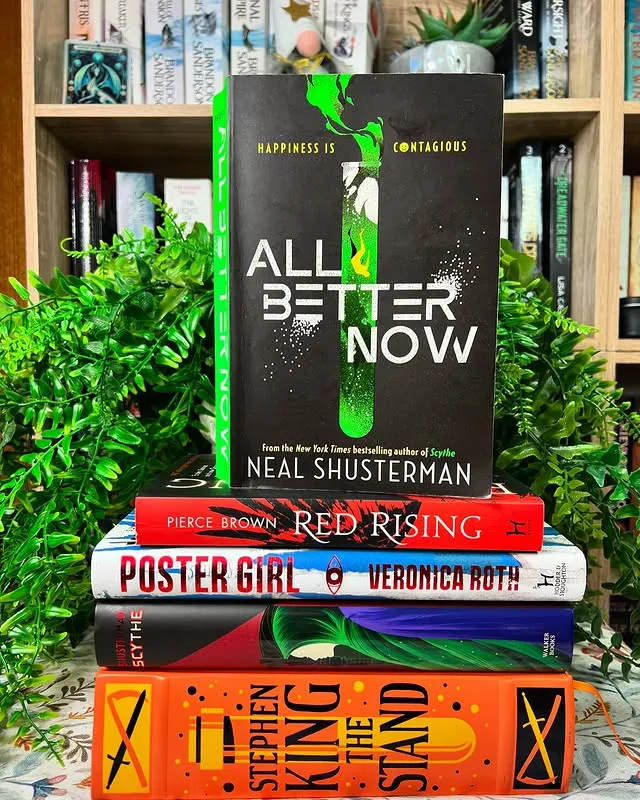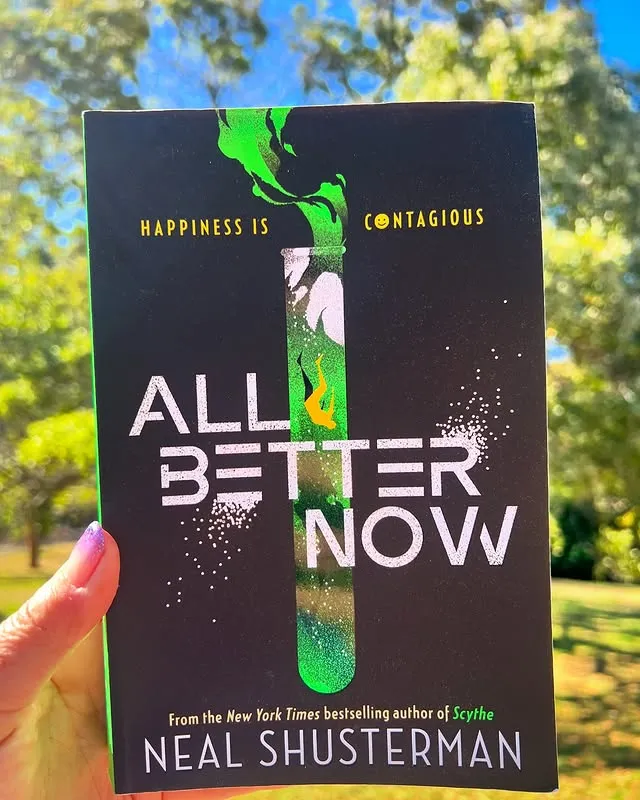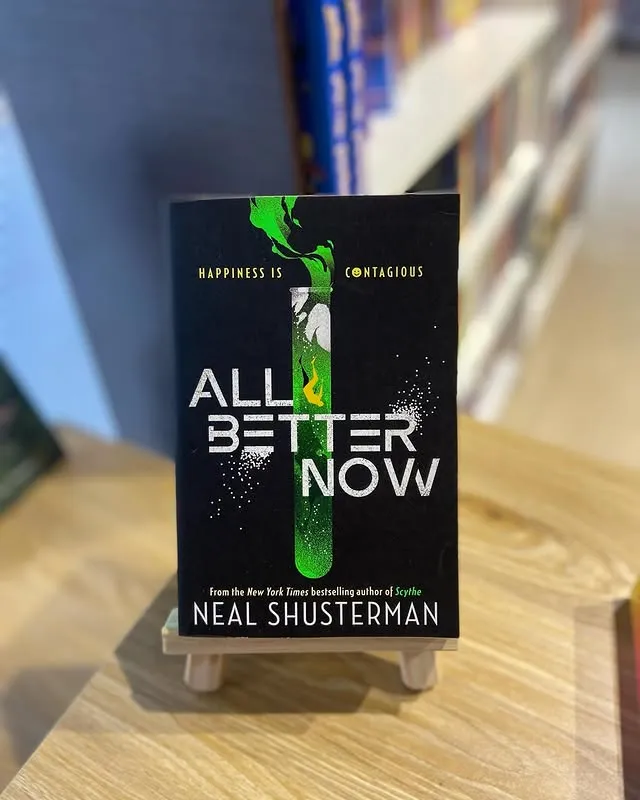Neal Shusterman’s All Better Now left me spellbound, its provocative questions lingering in my heart. This book review of All Better Now invites you to explore its thrilling and soulful depths.
I closed All Better Now by Neal Shusterman with a heavy heart and a racing mind. The book’s premise—a virus that gifts survivors with unshakable contentment—hooked me from the first page. It’s a story that feels both fantastical and eerily plausible, a mirror to our own world’s struggles with truth and change. Shusterman’s dystopian vision is as unsettling as it is captivating, and I found myself lost in its moral maze. This novel doesn’t just entertain; it demands you question what it means to be human.
The Crown Royale virus, with its promise of mental clarity and bliss, is a brilliant narrative device. It’s not just a plot point; it’s a philosophical challenge. I felt a shiver reading, “People who did follow the science and the rules wished death upon those who didn’t.” This line captures the divisive fervor that echoes our own pandemic-weary world. Shusterman’s ability to weave such relevance into a speculative tale is nothing short of masterful.
All Better Now asks: Is happiness worth the cost of individuality? I found myself torn, much like the characters, between utopian dreams and the messy beauty of human flaws. The emotional weight of the novel lingered with me long after I turned the final page. It’s a story that feels alive, pulsing with urgency and heart.

The Heart of a Divided World
The novel’s three protagonists—Ron, Morgan, and Mariel—are the beating heart of this story. Ron, the billionaire’s son, believes the virus will usher in global harmony. His idealism is infectious, yet I couldn’t help but question his motives. “If we judge the work by the sins and temperament of the creators, the world would be virtually void of art, literature, and music,” he muses, a line that struck me deeply. It’s a reminder of the grayness in human intention, a theme Shusterman explores with nuance.
Morgan, heir to a powerful consortium, stands as Ron’s foil. His determination to stop the virus feels grounded in logic, but it’s tinged with fear. I admired his resolve, yet I wondered if he was fighting for humanity or control. Shusterman crafts these characters with such depth that I felt their struggles as my own. Their clashing ideologies kept me on edge, eager to see where their paths would lead.
Mariel, immune to the virus, is the novel’s emotional anchor. Her indecision between the two extremes made her achingly relatable. I felt her pain as she grappled with her place in a world splitting apart. Shusterman’s portrayal of her inner conflict is raw and honest, pulling me into her journey. Each character’s perspective added layers to the story, making it impossible to pick a side.
The world-building is another triumph. Shusterman paints a society teetering on the brink of utopia or collapse. The tension between the contented recoverees and the fearful unaffected is palpable. I could almost feel the distrust simmering in the air, a testament to the author’s vivid prose. This is dystopian fiction at its finest—gritty, thought-provoking, and utterly immersive.
Critics have lauded the novel’s cerebral depth. Publishers Weekly calls it an “epic biological thriller” with “morally gray dilemmas” that ensnare readers. I agree wholeheartedly; the ethical questions kept me up at night. The plot’s slow build in the first half, as noted by some reviewers, didn’t deter me. It allowed me to savor the characters’ complexities before the explosive climax hit.
A Mirror to Our Souls
Shusterman’s wit shines through even in the darkest moments. His trademark humor, described by Kirkus Reviews as “darkly witty” and “wonderfully over-the-top,” lightens the novel’s heavy themes. I chuckled at the absurdity of a world where happiness is branded as dangerous. Yet, beneath the humor lies a sharp critique of power and manipulation. The novel’s villains—those who profit from discontent—are chillingly familiar.
The pacing, while occasionally uneven, never dulled my enthusiasm. The first half’s slower tempo builds tension, setting the stage for a breathtaking second half. I was glued to the pages as the plot twisted toward its “enigmatic, jaw-dropping conclusion,” as Publishers Weekly aptly puts it. Shusterman knows how to deliver endings that shock and satisfy. I gasped at the final reveal, my assumptions shattered.
What struck me most was the novel’s relevance. The Crown Royale virus feels like a metaphor for our own battles with truth and division. I found myself reflecting on how media shapes our perceptions, much like the campaigns in the story. Shusterman doesn’t preach; he invites you to think. This is what makes his work so powerful—it’s a conversation, not a lecture.
Mariel’s immunity, seen by some as a curse, resonated with me. I empathized with her struggle to find her voice in a polarized world. Her journey mirrors our own search for balance in chaotic times. I rooted for her, even as I questioned her choices. Shusterman’s characters don’t just live on the page; they challenge you to see the world differently.
The novel’s exploration of contentment as both gift and curse is its greatest strength. I found myself wondering: Would I risk infection for a chance at bliss? The question haunted me, as did the story’s broader implications. Shusterman forces you to confront your values, a hallmark of great literature. Booklist calls it “a good fit for contemporary thriller fans,” but I think it’s more—it’s a story for anyone who’s ever questioned the status quo.
Reading All Better Now felt like holding a mirror to my soul. It’s not just about a virus; it’s about what makes us human—our flaws, our dreams, our capacity for change. I loved how Shusterman balanced action with introspection, creating a narrative that’s both thrilling and profound. The quotes I highlighted, like the one about judging creators, stayed with me, sparking conversations with friends. This is a book that demands discussion.

About Neal Shusterman – Father of All Better Now
Neal Shusterman, a literary titan, has woven over thirty celebrated works, from the gripping Unwind series to the National Book Award-winning Challenger Deep. His storytelling, sharp with wit and rich with moral complexity, has earned honors like the Michael L. Printz for Scythe, captivating readers across genres. A proud father of four creative minds, Shusterman’s narratives, including All Better Now, challenge us to wrestle with life’s toughest questions. His scripts for film and television, alongside adaptations like Scythe for Universal, showcase his boundless imagination
As I set the book down, I felt a mix of awe and unease. Shusterman has crafted a story that’s as entertaining as it is unsettling. It’s a reminder that happiness, like truth, is never simple. I’m already eager to reread it, to uncover new layers in its rich tapestry. All Better Now is a triumph—a novel that challenges, delights, and lingers long after the final page.

